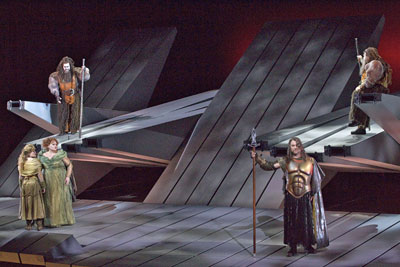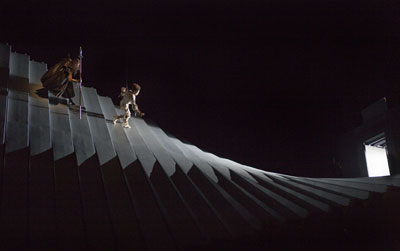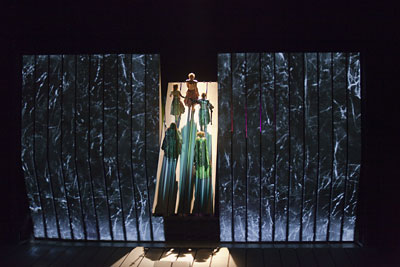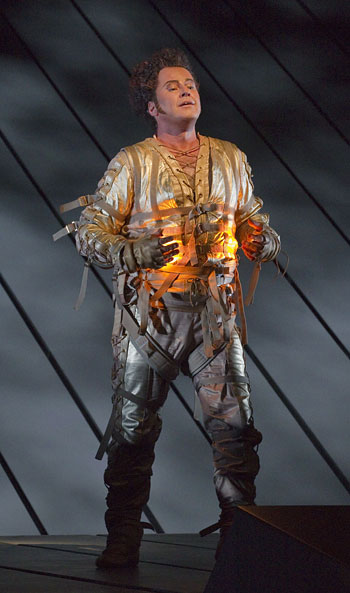The count-down begins: 5 minutes . . . 4 . . . 3 . . . 2 . . . 1 . . . The theater lights dim, the audience becomes quiet. There is an air of expectancy in the CinÉArts @ Palo Alto Square Theatre where it is 10 AM Saturday morning, as there is on the giant screen in front of us where it is 1 pm in the Metropolitan Opera House in Lincoln Center New York City.
Peter Gelb, General Manager of the Met appears on the screen to welcome us to the first of 12 Met HD operas which will be presented in this, the fourth year of the Met HD opera program. He is followed by a few clips of James Levine conducting rehearsals and several clips of Robert Lepage working on and commenting on the fantastic sets he designed for the upcoming Ring cycle. Normally this material would be shown during an intermission, but Wagner wrote the entire opera without a single break in the music, so naturally there can be no intermission even though the opera is almost 3 hours long. Deborah Voigt appears briefly back stage to tell us the opera is about to begin. The camera switches to the house side of the curtain. We hear slowly mounting applause from New York which increases to a roar when Levine appears, mounts the podium, and bows to the audience.
The overture begins softly, seductively. We almost have to strain to hear it. We are forced into a concentration that will not let up until the final chords three hours from now. There is a streak of red light representing incipient sunrise across the stage and I realize the curtain was never down. We see mottled blue emerging from the black below the red as a section of the Rhine becomes visible under the growing light.

The Rhine Maidens sing about their gold; Woglinde (Lisette Oropesa), Wellgunde (Jennifer Johnson), Flosshilde (Tamara Mumford
As the music blends seamlessly from the overture to Scene 1, the red disappears indicating that the sun has risen, and the blue loses its mottled aspect and becomes the pure Rhine river where the three Rhine maidens: Woglinde (Lisette Oropesa), Wellgunde (Jennifer Johnson), and Flosshilde (Tamara Mumford) are cavorting and singing.
Those 24 planks you see looking so different in the above pictures are the essential ingredient in the set of Producer Lepage and Set Designer Carl Fillion and will be that in all 4 operas of the Ring. They weigh 45 tons, are made of Plexiglas-coated aluminum, and required additional reinforcement under the stage. They are unbelievably versatile. They can be translated and rotated in three dimensions, as a whole, in groups, or singly. They can be straight, bent, or separated. They can apparently be shortened to indicate perspective, although my logical mind tells me that this must be an illusion fostered by the complex individual lighting (Thank you, Lighting Designer Etienne Boucher). Did I tell you I was impressed?
Alberich (Eric Owens) shows up just looking for a bit of love. The three Maidens take turns leading him on and then shoving him back down the gravelly bank of the Rhine and telling him how ugly he is. Not a very wise thing to do when the victim may be more powerful than you are. They compound their folly by not only telling him about the gold they are guarding and the fact that it is magic, but also that whoever can forge it into a Ring will be master of the universe – only that person will “first have to forgo Love.”
“No problem,” sings Alberich, “since love has already forgone me.” He grabs the gold and hustles off, leaving the Maidens surprised, stupid, and sad.
As the moans of the Rheinmaidens slowly fade away and smoothly segue into a godly motif, the lights do likewise. We find ourselves on the top of the world where the head god Wotan (Bryn Terfel) and his wife Fricka (Stephanie Blythe) are engaging in their favorite sport: arguing. It seems that Wotan had contracted with a couple of giants named Fasolt (Franz-Josef Selig) and Fafner (Hans-Peter Ké¶nig) to build him a mighty castle in the heavens. Fricka went along with this scheme in the hope that once he had his ideal castle Wotan would be content to stay at home and not go gallivanting and siring all over the world (most of Wagner’s women weren’t very smart – neither were his men, for that matter). She has only just found out that Wotan agreed to pay for the castle by handing over their daughter Freia (Wendy Bryn Harmer). Naturally she is horrified. (I confess that the family relations are not entirely clear to me. Freia and her brothers are all so young looking that I find it much easier to believe that they Fricka’s children; not her siblings).

The music takes a sudden ominous turn and the two giants come tromping on. These guys are supposed to be giants, but not many men on this earth can tower over Bryn Terfel and none of that small class can be expected to be opera-quality basses. Other directors have solved that problem with stilts, false heads, and other gimmicks but Lepage found a simpler solution – never show them on the same level.
Fricka summons Freia’s brothers Froh (Adam Diegel) and Donner (Dwayne Croft) to save their sister. “No problem,” says Donner raising his mighty hammer. “I’ll bop them on the head.” “Not so fast,” responds Wotan, blocking the bopping with his great spear. “The contract is inscribed on my great spear. If is broken, the gods will lose all relevance and perish. This problem must be solved with intelligence, not force.”
It seems that Wotan had made the original deal on the advice of Loge (Richard Croft) who told him not to worry. When the bill came due he’d figure out something (why am I reminded of Brad and TJ in the comic strip Luanne?). Sure enough. In true melodrama style Loge, semi-god of fire and all-around trickster slides down the plank in blazing brilliance. After a bit of hemming and hawing to build up the suspense, Loge admits he’s got a solution. We’ll go to Nibelung, steal the gold that Alberich stole from the Rhine Maidens and pay it to Giants in place of Freia.
“Sounds good,” says Wotan. “Shall we take the usual route down the Rhine?” Loge says he knows a short cut and off they go down a seemingly infinite set of steps as the music gives us the lovely entr’acte between scenes two and three.
The first person they meet there is Mime (Gerhard Siegel), Alberich’s brother and master forger. Mime has been forced to make not only the powerful Ring, but also the magic helmet Tarnhelm for Alberich. Instead of thanking him, Alberich beats him and taunts him, saying, “You are my slave and have to do anything I ask.” Not surprisingly, Mimi resents all this and is happy to help Loge by telling him everything he knows about Alberich. In particular, he tells him that Tarnhelm can render its wearer invisible or turn him into any other shape or form.
Alberich appears with all his newly created additional gold, kicks Mime out and says in an unfriendly tone, “What do you guys want?” Wotan starts to bluster, but Loge quickly shuts him up and fawns on the dwarf.
“We’ve heard, oh mighty one, that you have a magic helmet that allows you to assume the shape of any living being. Can this possibly be true?” “Will a giant snake convince you,” says Alberich? He walks towards the wings, putting Tarnhelm over his head and immediately after the most awesome snake I’ve ever seen encompasses the stage. “Pretty good,” admits Loge, “but suppose you wanted to hide. I bet you couldn’t manage something small, like a toad.” Alberich, of course, rises to the bait and disappears with the Tarnhelm. Wotan spots the Toad first. In a neat bit of teamwork he picks the toad up on the point of his spear and tosses it to Loge; Loge catches it deftly with one hand and immediately pops it a jar he’s holding with the other; he claps the lid on, secures it with a bit of rope, and in less time than it takes to tell the two of them are carrying the jar back up that long stairway.
Back at the top of the world with Alberich, now in his natural form but tightly bound, Wotan tells him to order his minions to bring up all of his gold if he wants to be released. He readily agrees, figuring that with Tarnhelm and the Ring it can easily be replaced. He doesn’t even object when Loge snatches up Tarnhelm, singing to himself that since he still has the Ring they’ll soon enough be sorry. But Wotan snatches the Ring from Alberich’s finger and puts it on his own. Alberich, defeated and thoroughly miserable is untied and slinks back to Nibelung. But before he goes he places a terrible curse on the Ring to the effect that it will bring nothing but misery and death to anyone who wears it.
The Giants reappear with Freia. They demand that the pile of gold they get must be big enough to totally conceal Freia from their view. All the gold goes into the pile but there is still a chink through which Freia is visible. OK, add Tarnhelm. We’ve got a deal. “No, wait. I can still see her eye,” says Fafner, “You’ll have to add the Ring.”
The whole story of the Ring is an epic one, and for most of the opera the characters seem more epic than human. But in the final scene there are two places where some humanity shines through. When Fafner realizes that he is actually giving Freia back to the Gods, he exhibits true sadness. Not just the anger-sadness of the loser in a power struggle, but genuine sadness at losing the only beauty that he ever knew in his grim life. I felt sorry for him.
The other is Wotan’s indecision when he sees that he must give up either Freia or the Ring. His acting and singing here was so convincing that if I didn’t already know the ending, I would have been on the edge of my seat. But then Erda (Patricia Bardon) the Earth-Goddess, oldest of the Aesir who knows everything but tells little mysteriously appears and tells Wotan that if he doesn’t give up the ring the consequences will be most dire. “Tell me more”, Wotan begs, but she disappears as mysteriously as she arrived.
Wotan reluctantly gives up the ring. Fasolt gathers up all the treasure. Fafner objects. They fight. Alberich’s curse claims its first victim as Fafner kills his brother and tromps off with the treasure. Wotan and Fricke walk up a magic Rainbow Bridge to Valhalla, led by their three children. But first Wotan fires a double-barreled shot of suspense as he says, “I’ve got a great new idea for Valhalla. But first I’ve got to pay a visit to Erda and find out a few things.”
As for Loge, he faces the audience and sings, “What fools these mortals be” – No, wait; that’s Puck’s line. Loge sings something more like, “What nuts these immortals be; I’m glad I’m only half a god,” and blazes off to his own domain of Fire.
And so Das Rheingold ends in true soap-opera style. What is Wotan’s great new idea? How will Fafner use the magic Ring? What will Wotan learn from Erda? Don’t miss Die Walké¼re, the next episode of this exciting musical drama. Coming to a theater in your neighborhood next May 18 and June 1.
Meanwhile, enjoy the 10 other MetHD treats:
LIVE__________OPERA_____________COMPOSER____ENCORE
OCT_09_____Das_Rheingold__________Wagner______OCT_27
OCT_23_____Boris_Godunov__________Mussorgsky___NOV_10
NOV_1_____ Don_Pasquale____________Donizetti_____DEC_1
DEC_11_____Don_Carlo______________Verdi________JAN_5
JAN_08_____La_Fanciulla_Del_West____ Puccini______JAN 26
FEB_12_____Nixon_in China___________Adams______MAR 2
FEB_26_____Iphigenie_en_Tauride_____Gluck________MAR 16
MAR_19_____Lucia_Di_Lammermoor____Donizetti _____APR 6
APR_09_____Le_Comte_Ory___________Rossini_______APR 27
APR_23_____Capriccio________________R. Strauss____MAY 11
APR_30_____Il Trovatore_____________Verdi________MAY 18
MAY_14_____Die Walké¼re____________Wagner_______JUN 1
The OperaNut
Photos: (Except where specified) Ken Howard
This review by Philip G Hodge appeared in sanfranciscosplash.com on October 14, 2010.













Your reviews are a treasure trove of insights and critical analysis. Very much appreciated.
Please fix the picture links in that Rhinegold review. I missed that one alas.
MetHD Gotterdamerung shown in Brisbane on 10 March. Like being there.
John Patten, Australia
Thanks for letting us know about the broken picture links. Fixed.